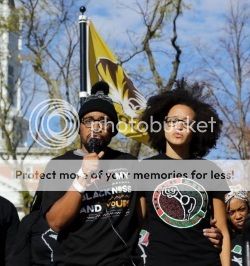
Protests over racism at the University of Missouri led to resignation of school’s President
Last week there were protests at the University of Missouri that led to the resignation of the school’s President for not responding to incidents of racism on campus. After the good that came from that organized action I was bothered by the treatment of student journalists by protesters who were biased just because of past treatment of their issues by other journalists. Discussion of controversial issues can’t happen with silence and/or censorship. Creating a bubble in public as a safe-space doesn’t actually resolve problems, it creates more of them.
Wolfe and Loftin were pushed out after weeks of protests by African-American students who were critical of their handling of a series racially charged incidents on campus. But it wasn’t until subsequent demonstrations and efforts by campus police to calm tensions following the administrators’ ouster that the university forged into dicey areas when it comes to the First Amendment.
First, a video surfaced of faculty, staff and students berating journalists and physically trying to remove a photographer from a public area on campus where protesters with the group Concerned Student 1950 set up a campsite.
Video showed the director of Greek Life, Janna Basler, screaming at a photographer to leave the area and later showed her and others physically forcing the journalist to back away from the campsite, even as the photographer noted his First Amendment right to be there. The same video showed an assistant professor of mass communications, Melissa Click, calling for “muscle” to help her eject the student journalist filming them and appeared to show her grabbing at his camera.
The university subsequently announced it had put Basler on administrative leave while it investigated her actions. Click was forced to resign from a courtesy appointment at the university’s Journalism School, but remains on the faculty at the Department of Communication.
Missouri controversy highlights academia’s free speech struggle
To be sure, what happened to the student journalists was wrong. The protests were in a public common area and so access to journalists couldn’t be denied. The first amendment applies to everyone.
What really bothered me was some people justifying the attempt at censorship of journalists because of past treatment of minorities and their issues by the press.
“Naomi Collier, a student activist at the University of Missouri, defended the treatment of a journalist who was attacked while trying to cover the unfolding events on campus.
On Monday, Tim Tai, a student journalist contracted with ESPN trying to cover the protests on campus, was accosted by the school’s Greek Life director and protesters.
When Tai approached students in the protest to get their opinion he was told he needed to go. The situation escalated and one protester asked for “some muscle” to remove Tai.
Collier told MSNBC’s Andrea Mitchell it was a “peaceful protest” and Tai was just a victim of the “backlash” from “fed up” students. Collier also said the student journalist was “insensitive” to the “feelings and emotions that [were] present at that time.””
It seems ironic that protesters over racism and mistreatment of minorities would treat a journalist badly because of past injustices by other journalists (real or imagined). That’s like saying all Muslims are terrorists or all black kids in hoodies are thugs because of past actions of members of those groups.
That’s sad.
Press reporting on racism and mistreatment of minorities is a valid concern but won’t be addressed through safe-spaces that exclude others especially the press. Only light can drive out the darkness of human behavior and silence and/or censorship keeps it dark.

